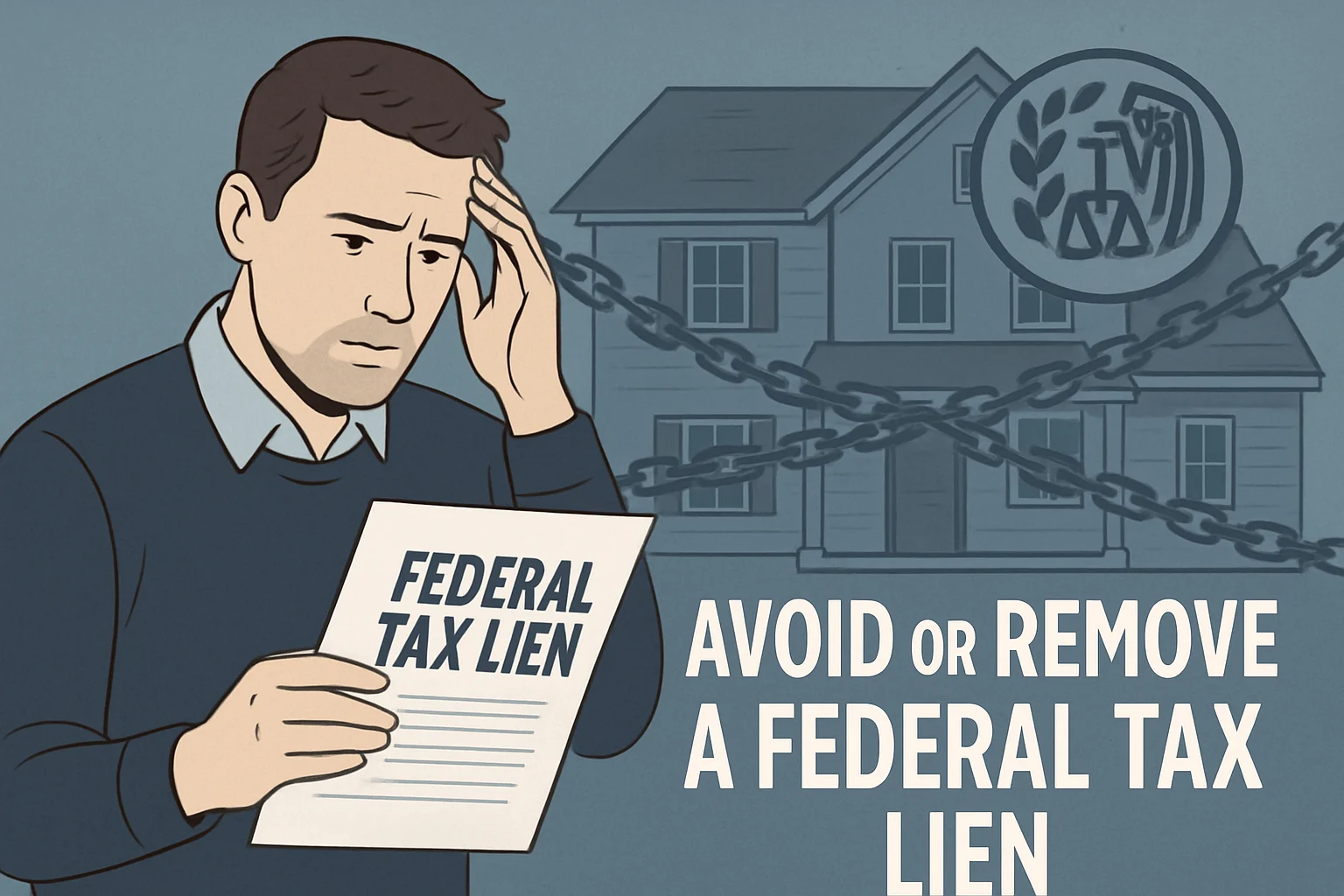How to Avoid or Remove a Federal Tax Lien on Your Property
When dealing with unpaid federal taxes, one of the most serious consequences is a federal tax lien. If left unresolved, this lien can have long-term consequences on your property, credit, and financial future. But don’t panic—there are ways to avoid and remove a federal tax lien with the right approach and knowledge.
❓ What is a Federal Tax Lien?
A federal tax lien is a legal claim by the IRS against your property—such as your home, car, or bank account—when you neglect or fail to pay a tax debt. It doesn’t mean immediate seizure, but it secures the government’s interest in your assets.
Once the IRS sends you a Notice and Demand for Payment and you ignore or fail to pay the debt, they may file a Notice of Federal Tax Lien in public records. This gives other creditors notice that the IRS has a legal right to your property.
🔒 How to Avoid a Federal Tax Lien
Avoiding a lien in the first place is always easier than removing one later. Here’s how to protect yourself:
1. Pay Your Taxes in Full and On Time
The simplest way to avoid a lien is to pay your taxes before the deadline. If you’re expecting a balance due and can’t afford it all at once, keep reading.
2. Request a Payment Plan Early
If you can’t pay in full:
-
Apply for an Installment Agreement with the IRS.
-
If your total debt is under $50,000, you can qualify for a streamlined payment plan online.
-
Stay current on payments and filing to avoid triggering a lien.
3. Communicate with the IRS
Ignoring IRS notices is a mistake. The IRS typically won’t file a lien unless you fail to respond or make arrangements. Early communication shows good faith.
4. Apply for Currently Not Collectible (CNC) Status
If you’re in financial hardship, the IRS may temporarily suspend collection activity. While interest and penalties accrue, this can delay or prevent a lien in some cases.
✅ How to Remove a Federal Tax Lien
If a lien has already been filed, don’t lose hope. Several IRS-approved options can help you remove or lessen its impact:
1. Pay the Debt in Full
Once paid, the IRS will release the lien within 30 days. You’ll receive a Certificate of Release of Federal Tax Lien, which clears the claim.
2. Request a Withdrawal (Form 12277)
Even if you’ve paid the debt or are making payments, you may request withdrawal of the lien notice under certain conditions:
-
Your debt is under $25,000.
-
You entered into a Direct Debit Installment Agreement.
-
You’ve made at least three on-time payments.
-
You’re current with all filings and payments.
A withdrawal removes the public record of the lien (unlike a release, which just ends the lien). This is helpful for credit scores and mortgage applications.
3. Apply for a Discharge of Property
If you’re selling a property or refinancing, a discharge lets the IRS remove the lien from a specific property even if the lien itself remains. This is common when:
-
Proceeds from the sale will go toward the debt.
-
Equity is too low to satisfy the lien fully.
4. Subordination
This doesn’t remove the lien but allows other creditors to move ahead of the IRS. It’s often used to:
-
Refinance a mortgage.
-
Secure a business loan.
You’ll need to file Form 14134 and meet certain financial conditions.
📉 How a Tax Lien Impacts You
Even if the IRS doesn’t seize your property, a tax lien can:
-
Damage your credit score (even though they’re not always listed now).
-
Block home sales or refinancing.
-
Make borrowing money more difficult.
-
Stay on your public record for years.
That’s why it’s critical to act fast and understand your options.
🛠️ Practical Tips to Manage or Remove a Tax Lien
-
Check IRS transcripts: Use your IRS account online to see if a lien has been filed.
-
Hire a tax professional: Enrolled Agents, CPAs, or tax attorneys can negotiate with the IRS.
-
Use the Taxpayer Advocate Service: If you’re facing delays or hardship, the TAS may be able to assist.
💡 Final Thoughts
A federal tax lien may feel overwhelming, but it’s not the end of the road. Whether you’re trying to avoid one altogether or remove an existing lien, there are multiple tools and solutions available. Timely communication with the IRS, exploring payment plans, and seeking professional assistance can help safeguard your property and peace of mind.
📞 Need Help?
If you’re facing a tax lien or other IRS troubles, don’t wait until it’s too late. Professional tax resolution services can negotiate on your behalf, protect your property, and guide you toward financial freedom.
